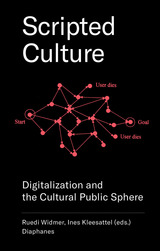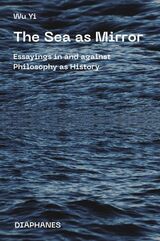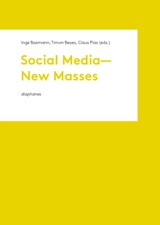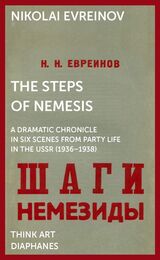154 scholarly books by Diaphanes and 6
start with S
154 scholarly books by Diaphanes and 6
154 scholarly books by Diaphanes
6 start with S start with S
6 start with S start with S

Scripted Culture
Digitalization and the Cultural Public Sphere
Edited by Ruedi Widmer and Ines Kleesattel
Diaphanes, 2018
When we look at the cultural public sphere through the lens of digitalization, a paradoxical picture emerges. In some ways, the digital age seems to have brought the goals of the Enlightenment to their fullest fruition, giving us boundless and instantaneous access to every kind of knowledge and art. But the internet and its platforms also frequently bring chaos, immersing us in a sphere of often unverified information whose scope is unimaginable. This book takes a tour through the current debates on digital culture, bringing together a wide array of perspectives from aesthetic theory, cultural studies, electronic media, and the arts.
[more]

Se constituer soi-même comme sujet anarchique
Reiner Schürmann
Diaphanes, 2020
Le présent livre constitue le recueil de trois articles-charnières de Rainer Schürmann. Deux d’entre eux, Que faire à la fin de la métaphysique ? et Des doubles contraintes normatives sont des échos, respectivement récapitulatif et prospectif, des deux opus magnum de Schürmann, Le principe d’anarchie et Les hégémonies brisées. L’autre texte, Se constituer soi-même comme sujet anarchique, jette un éclairage tout à fait inédit sur ce qu’on pouvait déjà savoir à partir des deux autres textes, abondamment repris dans les deux ouvrages-phares de leurs auteurs. Ils les font lire différemment. C’est cet éclairage entièrement neuf, quant à la portée praxique que revêt la vaste méditation post-métaphysique de Schürmann, qui fait du présent recueil un inédit, au sens le plus plein du terme.
[more]

The Sea as Mirror
Essayings in and against Philosophy as History
Wu Yi
Diaphanes, 2021
The Sea as Mirror traces the pressing and repressed material and symbolic presence of the Mediterranean Sea and the Atlantic Ocean from Plato to Heidegger. To do so, Wu Yi employs the maritime as a lens to understand the drive of philosophy as both a response to and moment within the impetus of Western colonization. Yi examines how philosophy has again and again constructed itself as a genre in opposition to the movement of deterritorialization and fluidity of mimesis. She does so via the method (meta, “after” + hodos, “way, journey”) of a series of essayings (in the original sense of trial, measure, attempt) across a geopolitical topography of discourses.
These include philosophical texts drawn from a constellation of historical topoi at the critical moments of their encounter with the maritime: Plato and Euripedes’s work from fifth-century Athens; Augustus and Plautus’s writings from republican and early imperial Rome; Shakespeare’s creations from Elizabethan England; Kant and Rousseau’s texts from enlightenment continental Europe; and the thinking of Husserl and Heidegger from interwar Germany of the twentieth century. For each historical topos, Yi juxtaposes different representations of and responses to the maritime through the reading of a philosophical text vis-à-vis the reading of a literary text. In so doing, she lays bare the deep political and moral ambiguity attributed to the ocean in Western philosophical and literary imaginaries.
These include philosophical texts drawn from a constellation of historical topoi at the critical moments of their encounter with the maritime: Plato and Euripedes’s work from fifth-century Athens; Augustus and Plautus’s writings from republican and early imperial Rome; Shakespeare’s creations from Elizabethan England; Kant and Rousseau’s texts from enlightenment continental Europe; and the thinking of Husserl and Heidegger from interwar Germany of the twentieth century. For each historical topos, Yi juxtaposes different representations of and responses to the maritime through the reading of a philosophical text vis-à-vis the reading of a literary text. In so doing, she lays bare the deep political and moral ambiguity attributed to the ocean in Western philosophical and literary imaginaries.
[more]

A Sinister Assassin
Last Writings, Ivry-Sur-Seine, September 1947 to March 1948
Antonin Artaud
Diaphanes, 2022
A Sinister Assassin contains original translations of Antonin Artaud’s last writings and interviews, most never previously available in English.
A Sinister Assassin presents translations of Antonin Artaud’s largely unknown final work of 1947–48, revealing new insights into his obsessions with human anatomy, sexuality, societal power, creativity, and ill-will—notably, preoccupations of the contemporary world.
Artaud’s last conception of performance is that of a dance-propelled act of autopsy, generating a ”body without organs” which negates malevolent microbial epidemics. This book assembles Artaud’s crucial writings and press interviews from September 1947 to March 1948, undertaken at a decrepit pavilion in the grounds of a convalescence clinic in Ivry-sur-Seine, on the southern edge of Paris, as well as in-transit through Paris’s streets. It also draws extensively on Artaud’s manuscripts and original interviews with his friends, collaborators, and doctors throughout the 1940s, illuminating the many manifestations of Artaud’s final writings: the contents of his last, death-interrupted notebook; his letters; his two final key texts; his glossolalia; the magazine issue which collected his last fragments; and the two extraordinary interviews he gave to national newspaper journalists in the final days of his life, in which he denounces and refuses both his work’s recent censorship and his imminent death.
Edited, translated, and with an introduction by Stephen Barber, A Sinister Assassin illuminates Artaud’s last, most intensive, and terminal work for the first time.
A Sinister Assassin presents translations of Antonin Artaud’s largely unknown final work of 1947–48, revealing new insights into his obsessions with human anatomy, sexuality, societal power, creativity, and ill-will—notably, preoccupations of the contemporary world.
Artaud’s last conception of performance is that of a dance-propelled act of autopsy, generating a ”body without organs” which negates malevolent microbial epidemics. This book assembles Artaud’s crucial writings and press interviews from September 1947 to March 1948, undertaken at a decrepit pavilion in the grounds of a convalescence clinic in Ivry-sur-Seine, on the southern edge of Paris, as well as in-transit through Paris’s streets. It also draws extensively on Artaud’s manuscripts and original interviews with his friends, collaborators, and doctors throughout the 1940s, illuminating the many manifestations of Artaud’s final writings: the contents of his last, death-interrupted notebook; his letters; his two final key texts; his glossolalia; the magazine issue which collected his last fragments; and the two extraordinary interviews he gave to national newspaper journalists in the final days of his life, in which he denounces and refuses both his work’s recent censorship and his imminent death.
Edited, translated, and with an introduction by Stephen Barber, A Sinister Assassin illuminates Artaud’s last, most intensive, and terminal work for the first time.
[more]

Social Media-New Masses
Edited by Inge Baxmann, Timon Beyes, and Claus Pias
Diaphanes, 2016
Mass gatherings are at the center of contemporary discussions about community formation, communication, and social control. As new digital technologies and social media platforms have emerged, the concept of the mass gathering has evolved in parallel to take account of the different ways masses and crowds may form, including digital masses like flash mobs and protest groups. At the same time, these new digital masses provide a remarkable opportunity to reevaluate the broader historiographical framework surrounding mass gatherings.
With Social Media—New Masses, Inge Baxmann, Timon Beyes, and Claus Pias have brought together a diverse group of sociologists, media and cultural studies theorists, and historians of knowledge and technology who, together, outline the contours of this expanding field of research and analyze the differences between the old and new conceptions of masses and the distinct conditions and political consequences for each. Contributors to the volume include Marie-Luise Angerer, Dirk Baecker, Christian Borch, Christoph Engemann, Charles Ess, Wolfgang Hagen, Peter Krapp, Mirko Tobias Schäfer, and Sebastian Vehlken.
With Social Media—New Masses, Inge Baxmann, Timon Beyes, and Claus Pias have brought together a diverse group of sociologists, media and cultural studies theorists, and historians of knowledge and technology who, together, outline the contours of this expanding field of research and analyze the differences between the old and new conceptions of masses and the distinct conditions and political consequences for each. Contributors to the volume include Marie-Luise Angerer, Dirk Baecker, Christian Borch, Christoph Engemann, Charles Ess, Wolfgang Hagen, Peter Krapp, Mirko Tobias Schäfer, and Sebastian Vehlken.
[more]

The Steps of Nemesis
A Dramatic Chronicle in Six Scenes from Party Life in the USSR (1936–1938)
Nikolai Evreinov
Diaphanes, 2022
The first-ever English translation of this dramatic work by Nikolai Evreinov.
In the 1910s the Russian theater director and theorist Nikolai Evreinov (1879–1953) insisted on the theatricalization of life. Twenty years later, Evreinov, who had left Russia in 1924, was in exile in Paris when Stalin staged three elaborate political show trials in Moscow. Evreinov then meticulously read the transcripts of the trials in the Russian-language press, collected material on Nikolai Bukharin and the other defendants, consulted with experts, and finally wrote a play, his response to the staging of a judicial farce. With this response, he also wanted to rehabilitate his idea of the theatricalization of life. After all, the theatricalization of life does not mean performing false confessions, constructing conspiracies, fabricating facts, or casting hired witnesses. In his theatrical theory, Evreinov was careful not to make the theater of life invisible. His play is therefore not a historical reconstruction, but an imaginary look behind the scenes, in which the Stalinist perpetrators confess to the real crime in the end: the theater. Expertly translated into English for the first time by Zachary King, The Steps of Nemesis brings a fascinating play to a whole new world.
In the 1910s the Russian theater director and theorist Nikolai Evreinov (1879–1953) insisted on the theatricalization of life. Twenty years later, Evreinov, who had left Russia in 1924, was in exile in Paris when Stalin staged three elaborate political show trials in Moscow. Evreinov then meticulously read the transcripts of the trials in the Russian-language press, collected material on Nikolai Bukharin and the other defendants, consulted with experts, and finally wrote a play, his response to the staging of a judicial farce. With this response, he also wanted to rehabilitate his idea of the theatricalization of life. After all, the theatricalization of life does not mean performing false confessions, constructing conspiracies, fabricating facts, or casting hired witnesses. In his theatrical theory, Evreinov was careful not to make the theater of life invisible. His play is therefore not a historical reconstruction, but an imaginary look behind the scenes, in which the Stalinist perpetrators confess to the real crime in the end: the theater. Expertly translated into English for the first time by Zachary King, The Steps of Nemesis brings a fascinating play to a whole new world.
[more]
READERS
Browse our collection.
PUBLISHERS
See BiblioVault's publisher services.
STUDENT SERVICES
Files for college accessibility offices.
UChicago Accessibility Resources
home | accessibility | search | about | contact us
BiblioVault ® 2001 - 2024
The University of Chicago Press









